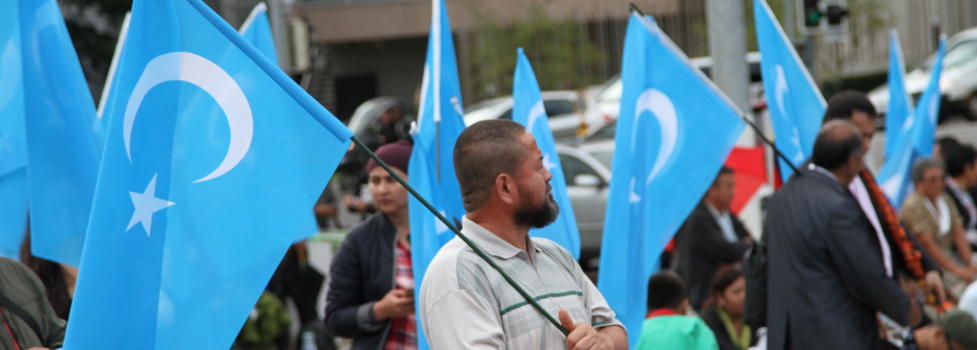Despite appalling abuses of the Uighur people, the world remains quiet. We must unite to voice our outrage
More than 12 million Muslims have effectively been taken prisoner in their own homeland, an area of north-west China officially referred to as Xinjiang, which means “New Dominion”. For tens of thousands, some estimate as many as one million, the imprisonment is literal. Concerned Xinjiang scholars, such as myself, have helped document and expose the crisis unfolding there through simple but tedious research requiring hundreds of hours scouring Chinese government documents and satellite imagery. Partly as a result of these efforts, a network of huge “concentration re-education centres” in the desert has been revealed. Government officials – who until recently angrily denied their existence – now insist those centres are providing essential vocational training for individuals influenced by the so-called “three evil forces” of extremism, radicalism, and terrorism said to threaten stability in the region
But the sheer scale of detention centres reflects a reality starkly at odds with the Chinese Communist party line. One analysis has detected at least 44 detention facilities in the region, with other estimates even higher. According to the BBC, one facility, at Dabancheng, could hold 130,000 people if used at full capacity. To put these figures into perspective, the number of Muslims who intelligence agencies believe may be at some “risk” of radicalisation in the UK, France and Germany combined is less than 125,000. Among the growing roster of inmates are internationally renowned academics such as Rahile Dawut, university president Tashpolat Teyip, the poet Qurban Mamut, and professional athletes such as footballer Erfan Hezim, as well as countless ordinary men and women – including some of my own friends.
Yet the vast majority of detainees have not been convicted of any crime. Instead, the Communist party relies on an arbitrary social taxonomy – referred to officially as a “social credit system” – to identify targets. Metrics such as age, faith, religious practices, foreign contacts and experience abroad sort Muslims into three levels: “safe”, “normal” or “unsafe”. Those labelled “unsafe” face an imminent risk of detention.
The ethnic Uighurs, who make up the vast majority of the region’s Muslim population, are plunged into an environment that seeks to erase their culture. Daily schedules imitate the Native American and Indigenous Australian boarding schools, which were meant to “kill the Indian, and save the man”. Detainees must conform to a standard appearance: they wear a common uniform, while pious dress (headscarves, long beards and traditional doppa skullcaps) is strictly prohibited. They are required to study standard Chinese, memorise excerpts from a 13th-century Confucian text, and recite patriotic aphorisms. Detainees must also attend lectures on socialist ideals and “illegal” religious practices. Meanwhile, they are taught “vocational skills” – mostly menial labour such as packing tea leaves – to “prepare” them for their eventual release.
The mass incarceration of young adults has left thousands of Uighur children without parents. The Communist party’s solution is to treat them as orphans and place them in “child welfare guidance centres”. Under the care of the state, they are denied regular contact with their extended family and removed from communities where Muslim and Central Asian norms shape daily life.
The few families spared the horror of re-education endure a form of home invasion. Government programmes such as “Visit the People, Benefit the People, and Bring Together the Hearts of the People” have led to more than a million Han civilians being sent to live alongside, or even with, Uighurs in enforced homestays. According to Xinjiang TV News, from 2016 to May 2018, these people – referred to sometimes as “big brothers and big sisters” – made 24m house visits, conducted 33m interviews (read: interrogations), and organised more than 8m “ethnic unity” activities.
Meanwhile, the government-appointed elder siblings keep a vigilant eye on, and detailed records of, any manifestation of “extremism”. This currently includes practices as mundane as using the greeting assalamu alaykum (peace be upon you), maintaining a pious appearance, keeping a Qur’an at home, or engaging in unsanctioned religious practices. An individual’s “stubborn” commitment to these behaviours is likely to be grounds for detention.
Above all, every Uighur endures a virtual custody enabled by a hi-tech system that records and archives human movement. In the regional capital of Urumqi alone, so-called “convenience police stations” have been built every 200 metres in the city’s Uighur districts. Authorities boast that the “zero-distance proximity” of stations ensures 24-hour surveillance and swift responses in the event of emergencies. Unlike Han Chinese in Xinjiang, Uighurs, alongside Muslim Kazakhs, are subject to more intense screenings – including face scans and ID checks – in the maze of checkpoints that have been built in every city. ens of thousands of high-resolution security cameras ensure there are “no cracks, no blind spots, no gaps” in the Communist party’s virtual panopticon.
Despite these appalling abuses, and the efforts of a number of journalists and organisations – including a UN human rights panel and US senators Marco Rubio and Chris Smith – the world remains largely unaware of this crisis or is unwilling to speak out about it for fear of possible political or economic consequences. But we must present a united voice of condemnation.
The Uighurs are running out of time to repair the damage inflicted on their culture, and restore broken bonds between generations. In his review of the famous Uighur historical novel City Buried By Sand, Abdulqadir Jalaleddin – who has since been detained – writes: “If I construct a hell of my own devising, no matter how terrifying its flames, I will call it heaven. But a heaven built by others will cause my trees to wither.” Uighurs now live in exactly that hell built by others, and will continue to do so unless we act.
• Timothy Grose is professor of China Studies with expertise in ethnic policy at the Rose-Hulman Institute of Technology in Indiana

Leave a Reply